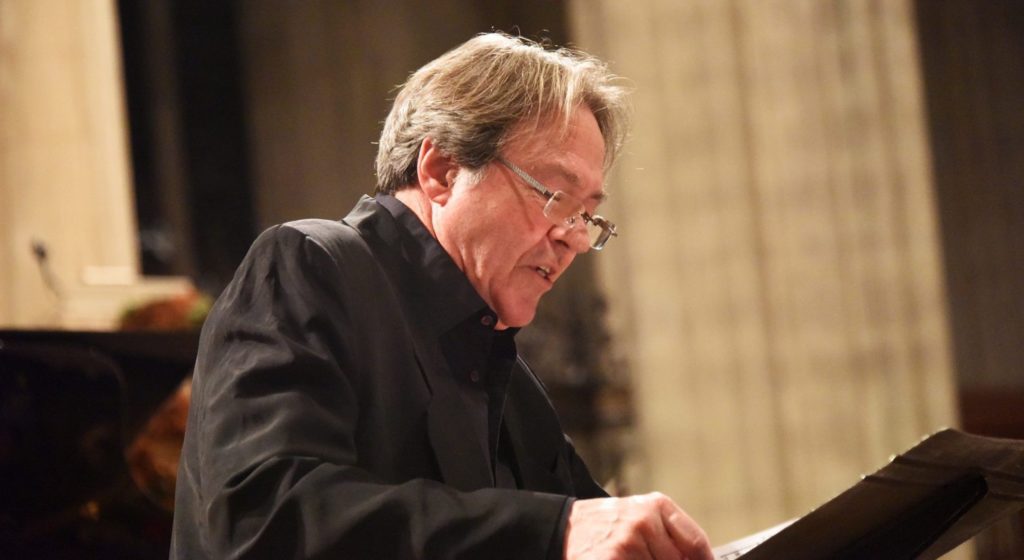PostClassical Celebrates Walt Whitman
By • November 12, 2018 0 1189

Excerpts from “The Wound-Dresser,” a poem in Walt Whitman’s 1865 collection “Drum-Taps,” were read by host Jeffrey Brown of “PBS NewsHour” at “I Sing the Body Electoral,” a Nov. 5 tribute to the poet by PostClassical Ensemble at Washington National Cathedral, where the multidimensional music presenter is ensemble-in-residence.
Audience members who frequent the north escalators at the Dupont Circle Metro station no doubt recognized phrases that, in 2007, were carved into the semicircular granite walls:
Thus in silence in dreams’ projections,
Returning, resuming, I thread my way through the hospitals;
The hurt and wounded I pacify with soothing hand,
I sit by the restless all the dark night — some are so young;
Some suffer so much — I recall the experience sweet and sad …
Whitman — whose bicentennial is next year — was writing about his comforting of wounded soldiers as a wartime volunteer. According to one of the evening’s speakers, Martin Murray, founder of Washington Friends of Whitman, at least 56 facilities in the District of Columbia served as hospitals during the Civil War. Whitman made hundreds of visits, often to the Armory Square Hospital on the National Mall and to the Patent Office building (now home to the Smithsonian American Art Museum and the National Portrait Gallery).
Seated in the choir section on the eve of the midterm elections, the audience also heard commentary by composer Curt Cacioppo; by Lorenzo Candelaria, dean of the arts at the State University of New York at Purchase, who talked about growing up in Texas “too Mexican and too Catholic” and made a pitch for arts education, which changed his life (he went to Oberlin and Yale as a violinist); and by Brian Yothers, professor of English at the University of Texas at El Paso, who noted that Whitman was “enamored of music,” both popular tunes and opera.
The extended remarks framed music selections expertly performed by baritone William Sharp and pianist Wan-Chi Su: four Whitman poems set by Kurt Weill in the 1940s — “Beat! Beat! Drums!,” “Oh Captain! My Captain!,” “Come Up from the Fields Father” and “Dirge for Two Veterans” — and the premiere of a piece by Cacioppo, “(I, madly struggling, cry),” commissioned by PostClassical.
Sharp, a PostClassical regular who teaches voice at Baltimore’s Peabody Conservatory, is known for his performances of songs by Charles Ives and other 20th-century American composers. Possessed of a nimble and powerful voice, he has a way of adding just the right dose of theatricality to musically informed renditions of works that are often more challenging than they seem. Su was a precise and enthusiastic collaborator, though a cathedral is not an acoustically conducive venue for a baby grand.
“Tonight’s concert is an experiment,” said Joseph Horowitz, executive director of PostClassical, before initiating a Q&A with the speakers and with Angel Gil-Ordoñez, the group’s co-founder and music director. Gil-Ordoñez generally conducts a chamber orchestra at PostClassical events, which are always thematic and often involve multimedia.
Though the musical portion of the program was relatively slight, it reinforced the evening’s topics — all seeming to converge around midterm time — of immigration, voting, war (the Armistice centennial) and America’s essential nature. This last was one of the great themes of Whitman, who, according to Yothers, espoused a philosophy of “patriotic cosmopolitanism.”
Weill, a German Jewish refugee, wrote three of the Whitman songs in 1942 in response to Pearl Harbor. “Beat! Beat! Drums!” is, as one would expect, harsh and percussive, while “Oh Captain!” and the “Dirge” are in his Americanized style, recalling “Oklahoma” rather than “The Threepenny Opera” he wrote with Bertolt Brecht. The later “Come Up from the Fields, Father,” about a letter home telling of a farmboy’s death, is a moving mini-drama, accommodating Whitman’s free verse more naturally than does the Broadway-song mold.
Cacioppo’s piece was a captivating musical mural, incorporating portions of Whitman’s “Passage to India,” “Proud Music of the Storm” and “By Blue Ontario’s Shore,” along with lines from Emma Lazarus’s “The New Colossus” about the Statue of Liberty. “The Statue herself escorted me through this process,” the composer said, calling the piece’s “Welcome” aria “a metaphor for immigration.”
Next up for PostClassical, on Jan. 23, is “Cultural Fusion: The Gamelan Experience,” described as a “unique mega-event, which will transform the Great Nave into an exotic cultural kaleidoscope.” The concert will feature Javanese and Balinese gamelan music, dancers, archival films and works by Debussy, Ravel, Poulenc, Messiaen and Lou Harrison, plus the D.C. premiere of a piano duet performed by Su and Benjamin Pasternack. Violinist Netanel Draiblate will be the soloist in Harrison’s “Suite for violin, piano, and chamber orchestra.”

